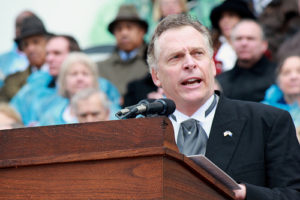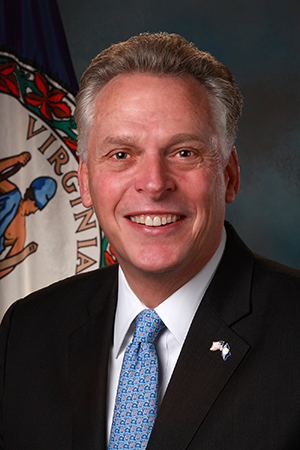RICHMOND — Whistle-blower protection moved forward this week after a Senate committee voted 36 to 1 in favor of House Bill 728, which would make it illegal to terminate an employee for reasons related to that person’s exposure of waste, fraud or abuse.
“Intimidation and threats are a problem when it comes to quashing the willingness of a public employee to look after the taxpayers,” said Delegate L. Scott Lingamfelter, R-Woodbridge, who introduced three bills on this topic — House Bills 728, 731 and 739. “So I think going forward, my intent is to correct a defect in the law because under current law it’s not clear what a court does when there is a ‘mixed motive’ for the dismissal of an employee.”
The legislation is important to people like Henry Lewis, a former Alexandria architect who won his whistle-blower case against the city last year, after a jury decided his 2011 termination violated the Virginia Fraud Against Taxpayers Act, passed shortly before Lewis lost his job. Lewis is represented by attorney Zachary Kitts, who claims on his website to be the principal architect behind the 2011 amendments to the FATA.
Kitts said he told legislators, including Lingamfelter, he thought the legislation was needed.
“There’s a risk that a defendant can say ’99 percent of the reason that we terminated this person’s employment was because they complained about fraud against the government,’” Kitts said, “but they could say one percent was a lawful reason and they could win the case based on that.”
Lingamfelter repeated Kitts’ assertion that whistle-blowers can be unjustly fired if the person who fired them for exposing fraud also claimed to have legitimate reasons to do so. Moreover, he introduced HB731, which could shift liability onto the agent who illegally terminates a whistle-blower, in addition to the institution itself.
HB731 was defeated twice in the Courts of Justice Senate committee by tie votes that fell, by the majority, along party lines. Different members failed to register votes for each session. However, if the committee had voted on the bill again — and all members voted the same as they did previously — the bill would have passed, making supervisors liable for illegal terminations, in addition to the institutions they represent. On the bill’s final consideration, one member was not present: Sen. Thomas K. Norment, R-Williamsburg. Although Norment favored the bill, the absence of his vote caused its defeat. Norment did not respond to inquiries regarding his absence.
“An abusive supervisor can escape any judgment in a court and it’s the city, town or county that bears the full cost,” Lingamfelter said. “Shouldn’t that supervisor bear some of the wrongdoing, since they’re the one who committed it?”
Director of General Services for the City of Alexandria Jeremy McPike is one such supervisor, according to Lingamfelter. McPike made the recommendation that Lewis be terminated as city architect during construction of a police station. He also ran against Lingamfelter in the 2013 election for a seat in the House.
“This language in this legislation coming from Lingamfelter doesn’t surprise me at all,” McPike said. “He invited a trial attorney to our debate last fall to try to intimidate me. He sat in the front row. It’s petty politics.”
The legislation, as introduced by Lingamfelter, states that a whistle blower may not be discharged, threatened or otherwise discriminated against, “in whole or in part,” for reasons connected to the exposure of fraud, waste or abuse.
“If it were in a township that I was in charge of, (McPike) wouldn’t have his job,” Lingamfelter said, “because I think that anybody who intimidates someone whose greatest sin is they’re just trying to point out taxpayer fraud should not be supervising other people.”
McPike said Richmond is beginning to operate like Washington, D.C.
“It’s legislation driven, frankly, by the trial attorneys again,” McPike said. “Obviously, they’re in cahoots with one another.”
Kitts said one of the bills adds the words “in whole or in part” to the motivation section of the statute.
“Any employee shall be entitled to all relief necessary if that employee is discharged, demoted, suspended, threatened, harassed, or in any other manner discriminated against,” Kitts said, “’in whole or in part,’ because of lawful acts done by the employee.”
The purpose of existing fraud and abuse law is to “make whole” any person fired in retaliation for exposing fraud. When Lewis won his case against the city under the new law, he was then entitled to recovery in the form either of reinstatement of his job as city architect, or front-pay to match the number of years he could have worked; however, he had to appeal for that money. The city was denied its request for an appeal by the Virginia Supreme Court. Instead, the court heard Lewis’ appeal for owed equities and benefits pay.
At the hearing, the court asked Alexandria City Attorney Jonathan Mook how his city can ignore language in the FATA that says a person fired in retaliation “shall” be compensated for lost wages and benefits.
“How can you ignore the ‘shall’ in the law?” Justice William C. Mims asked. “How can reinstatement or front-pay not be required to make Henry Lewis whole?”
Mook said Lewis is not entitled to back pay because any estimations on how long Lewis might have worked for the city would be speculative, to which Mims responded by asking, “Wouldn’t any estimation be speculative?”
Lingamfelter’s legislation would turn the city’s defense into an argument against itself.
Mook told the court that Lewis was fired for at least two reasons: insubordination, or failing to maintain a harmonious work relationship with co-workers and supervisors; and Lewis’ refusal to sign false invoices at McPike’s request. Therefore, the city’s estimation of how long Lewis might have stayed on differs by at least seven years when compared to what Mook called “abusive” and “punitive” estimations by Lewis and Kitts.
Lingamfelter agrees there is an effort to politicize his whistle-blower legislation.
“I know that people like (Charlottesville Democratic Delegate David) Toscano want to politicize this. I got it. I understand that. That goes on down here all the time,” Lingamfelter said.
Toscano did not respond to requests for comment.
Co-Chairs of the Senate Committee on Courts of Justice Henry L. Marsh, D-Richmond, and A. Donald McEachin, D-Richmond, did not respond to requests for clarifications as to whether the bill would be voted on for a third time early this week.
HB728 awaits the signature of Democratic Gov. Terry McAuliffe. HB739 was left in committee.
This story appeared in The Virginia Free Citizen and Henrico Citizen.


